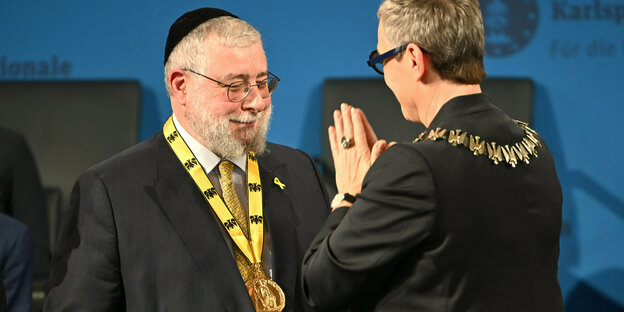The president of the European Rabbinical Conference, Pinchas Goldschmidt, will receive the Charlemagne Prize 2024. In his acceptance speech he finds powerful words.

“I am a European at heart and soul,” said Pinchas Goldschmidt on Thursday at the awards ceremony in Aachen. Photo: Henning Kaiser/dpa
SEDAN taz | Anyone who believed that rabbis were secretive creatures because of their religious office and that they strove for balance and harmony in a similar way to Christian dignitaries was proven wrong Thursday. The president of the European Rabbinical Conference, Pinchas Goldschmidt, received the prestigious Charlemagne Prize. And Goldschmidt not only expressed his gratitude for the honor bestowed upon him by European unification. It was also very clear.
The winner of this year's Charlemagne Prize is not only Goldschmidt, but also the Jewish communities of Europe, for his services to “peace, self-determination of peoples and European values, tolerance, pluralism and understanding,” as stated in the explanatory memorandum. But the honorees are not doing well at all. “The winners of the 2024 Charlemagne Prize live in fear,” Goldschmidt said, referring to rising anti-Semitism in Europe following the Hamas pogrom in Israel.
Hatred of Jews has been “unleashed” since October 7, the rabbi explained, referring to Islamist fundamentalism, hatred of Israel and an anti-Zionism that actually hides anti-Semitism, and he did not forget to mention the protests in universities. where it is about “hatred and violence.” “Do something about it,” he demanded. “I am a European at heart and soul,” said Goldschmidt. But Jewish life is no longer a given in Europe.
The Charlemagne Prize winner's clear words were not a total surprise. The 60-year-old leader of more than 700 European rabbis is known for speaking clearly. This was already the case in Moscow, where from 1993 he rebuilt ailing Jewish communities as chief rabbi.
In Russia he is considered an “enemy agent”
After Putin's attack on Ukraine, Goldschmidt refused to praise the war. Instead of submitting, he went into exile. Russia then declared him an “enemy agent.” “We are seeing increasing anti-Semitism as Russia returns to a new type of Soviet Union,” Goldschmidt said in late 2022, calling on Jews to leave Russia. In Aachen, Goldschmidt recalled the situation in Russia and called for greater support for the opposition there. “It's also about us, about our values, about our freedom,” he said.
Pinchas Goldschmidt grew up in Zurich as the son of an Orthodox Jewish family. He studied in the United States and Israel and was ordained a priest by the Chief Rabbi of Jerusalem in 1987. He has been living in Israel since his forced withdrawal from Moscow. Because the headquarters of the European Rabbinical Conference is in Munich, the director often travels to Germany.
As much as Goldschmidt finds clear words in the fight against anti-Semitism, the rabbi, who speaks seven languages, strives to maintain a dialogue with Christians and Muslims. He founded the first pan-European Muslim and Jewish Leaders Council (MJLC) to open dialogue between Europe's 1.6 million Jews and 40 million Muslims.
Yes, he also sees the images of Gaza and has problems with the Israeli government, Goldschmidt stated at the end of his acceptance speech for the Gaza war. But it is Hamas that holds the key to the release of the hostages. And Goldschmidt uttered exactly these four words: “Bring them home now.”
